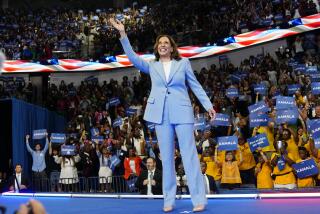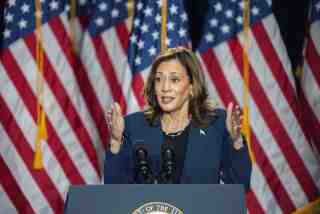With departure of Mike Pence, Republican presidential field looking fallow right now
Reporting from Washington — So Mike Pence is out. The question remains, as it has for some time: Who, exactly, is in?
Here’s the quick and dirty answer: Herman Cain, Fred Karger and Jimmy McMillan.
Those are not the starting down linemen for the Green Bay Packers. Cain is an African American talk show host and former pizza company CEO from Georgia, Karger is a California political consultant and gay activist, and McMillan is the leader of the “Rent is Too Damn High” party in New York, and is now probably best known for being parodied on “Saturday Night Live.”
That’s your current Republican field for the 2012 presidential race.
Pence, a congressman from Indiana, told supporters in a letter Thursday that he would not pursue the presidency, disappointing some conservative activists looking for some fresh blood in a field currently populated by a bevy of familiar faces.
At this point in 2007, GOP candidates who had formally declared included John McCain, Mitt Romney, Ron Paul, Tommy Thompson and Duncan Hunter. (Not to mention a fellow named Barack Obama on the Democratic side.)
While Romney is widely believed to be preparing a second run, he reiterated this week that he’s still testing the waters. “We are doing the things we need to keep in the public eye,” he told Fox News, “but we haven’t made a decision at this point.”
Those things included a recent “listening tour” of the Middle East, including at stop in Afghanistan. And Romney will be boosting his public profile next week as he appears on ABC’s “The View” and Piers Morgan’s show on CNN on the same day.
Sarah Palin has done little recently to quell speculation that she is planning a bid. Her lengthy 1,700-word response to President Obama’s State of the Union address was as serious a critique she has offered of the current administration. On Feb. 4, she will be delivering the keynote address at a banquet celebrating the 100th anniversary of Ronald Reagan’s birthday at his Reagan Ranch Center in Santa Barbara.
According to the Young America’s Foundation, which is sponsoring the event, “Gov. Palin will draw parallels to today while calling for young people to continue the Reagan revolution into the future.”
Shortly before that speech, Tim Pawlenty, the former Minnesota governor, will be wrapping up a book tour in Iowa. Pawlenty has said he would make a decision sometime in the spring.
Mike Huckabee, the former Arkansas governor and current Fox News personality, will be traveling Iowa in February on a book tour of his own. Last week, Huckabee told an audience that he would skip the first presidential debate at the Reagan Presidential Library in May. (So far, the slate for that debate is looking pretty anemic.) And when candidates gather for a debate in New Hampshire in June, Huckabee is scheduled to be on an Alaskan cruise with Christian musicians.
Even lesser-known potential candidates such as Mississippi Gov. Haley Barbour, Indiana Gov. Mitch Daniels and former Sen. Rick Santorum — any of whom you would think would benefit from an early start in order to build their national name recognition — have said they’re putting off a decision about running.
Finally, that faint sound you hear is the slight buzz beginning to build around Sen. John Thune of South Dakota. No one may have been helped more by Pence’s decision to forgo a bid than Thune, a favorite of conservatives both inside and outside of Washington. In an interview with ABC News earlier this week, Thune made note of the lack of a true front-runner.
“Obviously, there’s a big opportunity on the national field,” Thune said.
The idea of a Thune candidacy was enthusiastically endorsed by Senate Minority Leader Mitch McConnell (R-Ky.) earlier this week. “I think John is an extraordinarily impressive individual,” McConnell said in an interview on MSNBC. “I hope he will run. I think he would make a great president of the United States.”
Sen. James Inhofe of Oklahoma cited another reason to back Thune. “He’s taller than our president,” he told the National Review. (As history has shown: Never discount height when it comes to candidates.)
Why has the field remained so still? Money is one reason — this promises to be the most expensive presidential campaign in history and a later start helps save resources. But another large factor is the political lesson imparted by the tumultuous 2010 congressional midterm campaign season, in which front-runners quickly became targeted by “tea party” activists and where just about any candidate tied to the establishment suffered as a result.
A third reason could involve the president, who is enjoying a resurgence in popularity. Rising GOP stars such as Thune, Daniels or perhaps someone like Gov. Chris Christie of New Jersey, may want to hold off as long as they can to see if taking on an incumbent president with reasonably high approval ratings makes sense, or whether they might be better off waiting until 2016.
Still, potential entrants like Thune know that their window for getting in is a short one. “We realize that if you’re going to do this, you have to get moving,” he said.
He could be speaking for the entire GOP slate of maybe-candidates. Fairly soon, something’s gotta give.
More to Read
Inside the business of entertainment
The Wide Shot brings you news, analysis and insights on everything from streaming wars to production — and what it all means for the future.
You may occasionally receive promotional content from the Los Angeles Times.










